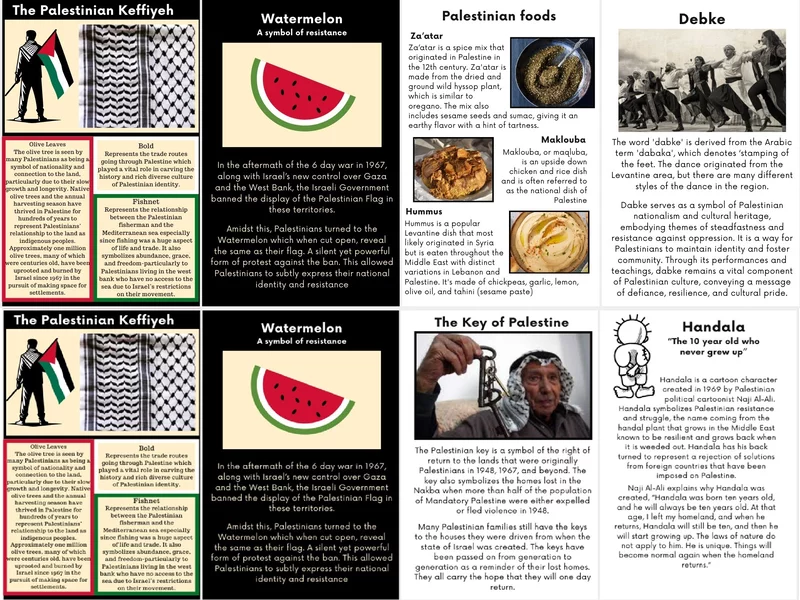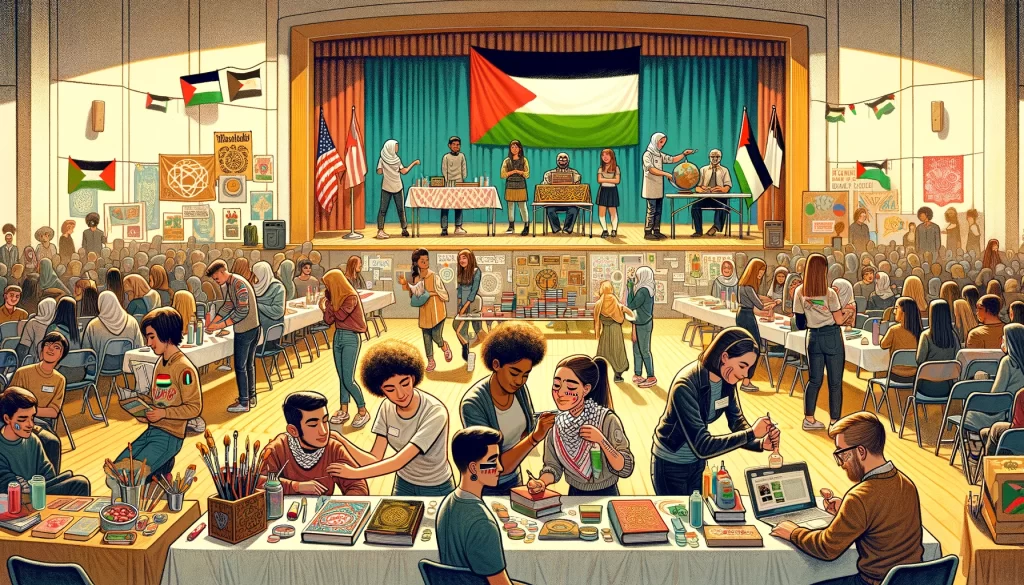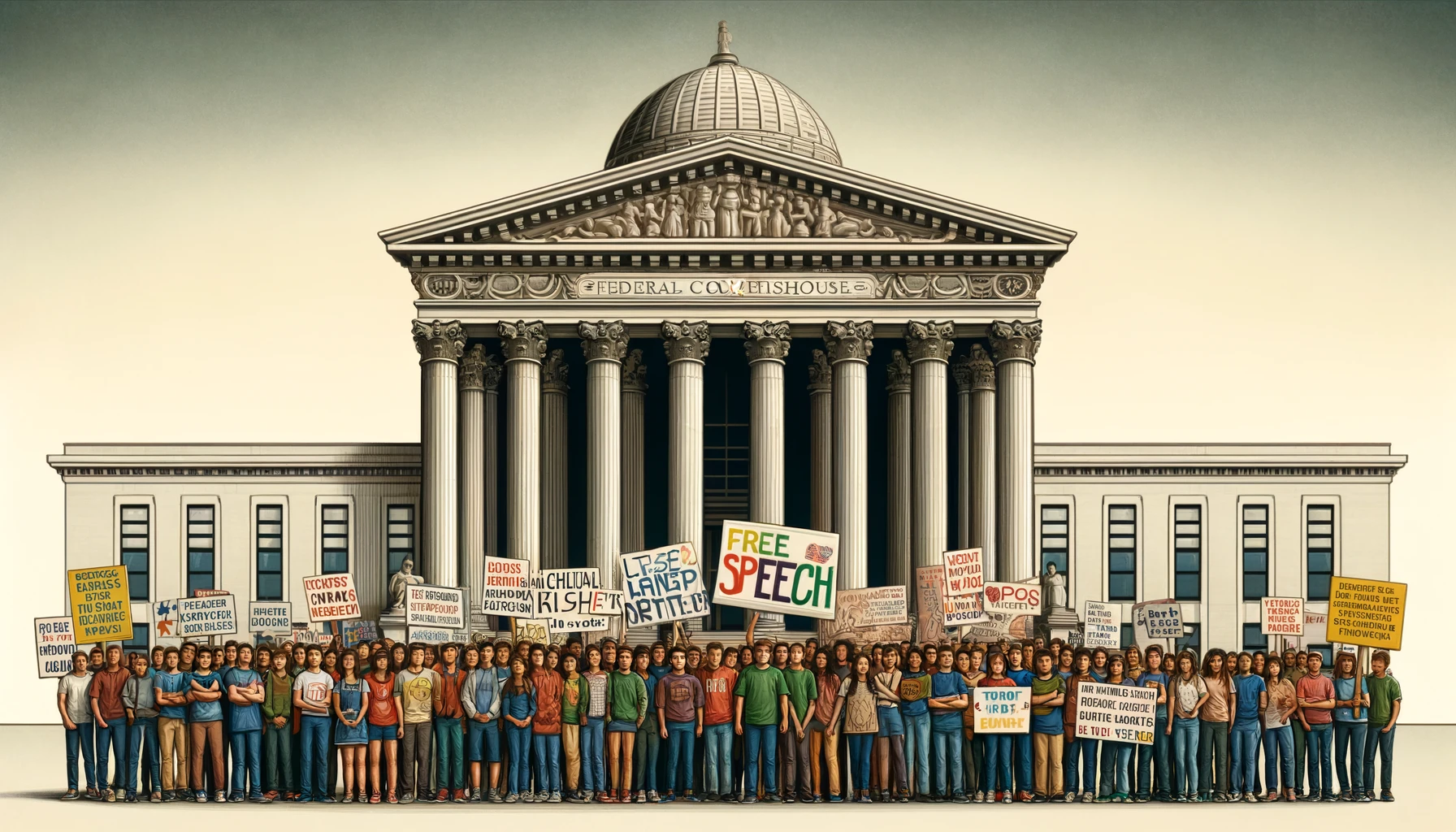In Washington, D.C., a group of high school students from Jackson-Reed High School, represented by the American Civil Liberties Union (ACLU) of the District of Columbia, have initiated a federal lawsuit against their school principal and the school district. The lawsuit focuses on the censorship of the Arab Student Union’s expressions of pro-Palestinian viewpoints, which the students argue infringes upon their rights to free speech.
The controversy stems from the administration’s refusal to allow the Arab Student Union to conduct its Palestinian Culture Night as planned. The students’ planned activities included distributing a one-page “zine” that described various Palestinian symbols, offering face paint “tattoos,” and handing out pro-Palestine stickers. Additionally, the school allegedly blocked the showing of a documentary titled “The Occupation of the American Mind,” which critiques Israel’s policies towards Palestinians.

Credit: Arab Student Union via ACLU
The students’ legal action claims that the school’s actions were biased, aiming to silence their perspective on the conflict between Israel and Hamas in Gaza. This conflict escalated significantly following a Hamas-led attack on October 7, which, according to Israel, resulted in the deaths of 1,200 people. On the other side, health officials in Gaza report over 34,000 Palestinian casualties.
The situation at Jackson-Reed High School occurs amid broader national protests on college campuses, where students are voicing their demands for an end to the war in Gaza.
Art Spitzer, Senior Counsel at ACLU-D.C., likened this case to a landmark Supreme Court decision from the Vietnam War era. In 1968, the Tinker v. Des Moines case established that students do not lose their First Amendment rights to free speech upon entering school premises. This precedent was set after students in Des Moines, Iowa, were disciplined for wearing black armbands to protest the Vietnam War, leading to a Supreme Court ruling in their favor.

Despite their legal challenges, the students at Jackson-Reed High School managed to hold their Palestinian Culture Night, although it was not as they initially envisioned. The school imposed restrictions, such as requiring pre-approval of the books and symbols to be displayed at the event.
With the school year approaching its end for seniors on June 7, the students are urging a federal judge to expedite their case. They hope to receive permission to host the documentary screening before the academic year concludes.
This article is based on the following article:

Background Information
By understanding these background elements, readers can better appreciate the legal, historical, and geopolitical nuances in the lawsuit described in the article. This knowledge not only helps in comprehending the specific situation at Jackson-Reed High School but also in recognizing the broader context of student rights and international affairs.
1. First Amendment Rights and Free Speech in Schools
- The First Amendment of the U.S. Constitution guarantees freedoms concerning religion, expression, assembly, and the right to petition. It forbids Congress from restricting the press or the rights of individuals to speak freely.
- Free Speech in Schools: The First Amendment rights extend to public schools, where students are not stripped of their constitutional freedoms. However, the school environment also demands certain restrictions on free speech to maintain order and discipline. The balance between allowing free speech and maintaining school order is a central theme in legal debates and court decisions concerning school policies.
2. Tinker v. Des Moines Independent Community School District (1969)
- This landmark Supreme Court case set a significant precedent for free speech in schools. In 1965, students wore black armbands to their school to protest the Vietnam War. The school asked them to remove the armbands and suspended them when they refused, which led to a lawsuit. The Supreme Court ruled in favor of the students, stating that students do not “shed their constitutional rights to freedom of speech or expression at the schoolhouse gate.”
- Importance: This case established that students could express themselves freely unless their actions disrupted the school environment. It’s often referenced in cases involving student speech rights.
3. Israel-Palestine Conflict
- Basic Overview: The conflict between Israelis and Palestinians is a long-standing and complex geopolitical issue centered on disputes over land, sovereignty, and national identity. It began in the mid-20th century amidst the establishment of Israel and the displacement of many Palestinians.
- Recent Events: The article mentions ongoing violence between Israel and Hamas (the de facto governing authority of the Gaza Strip, considered a terrorist organization by many countries, including the United States). The conflict has seen numerous escalations, leading to significant casualties on both sides. Events like these often provoke international debates and protests, including the expressions of solidarity or criticism from various groups around the world, including student organizations.
4. Student Activism
- Role in Social Change: Students have historically been at the forefront of many social and political movements. Through protests, demonstrations, and other forms of activism, students have influenced change and brought attention to major issues.
- Current Trends: Modern student activism often extends to international issues, where students express their support or criticism of global events and policies, reflecting a global consciousness among young people.

Debate/Essay Questions
- Should high schools have the authority to censor student organizations’ events if the content is politically sensitive?
- Does preventing the display of certain symbols or the distribution of specific literature at school-sponsored events constitute a violation of the First Amendment?
- How should schools balance the need for a neutral educational environment with encouraging students to engage in important global issues?
Please subscribe to Insight Fortnight, our biweekly newsletter!
